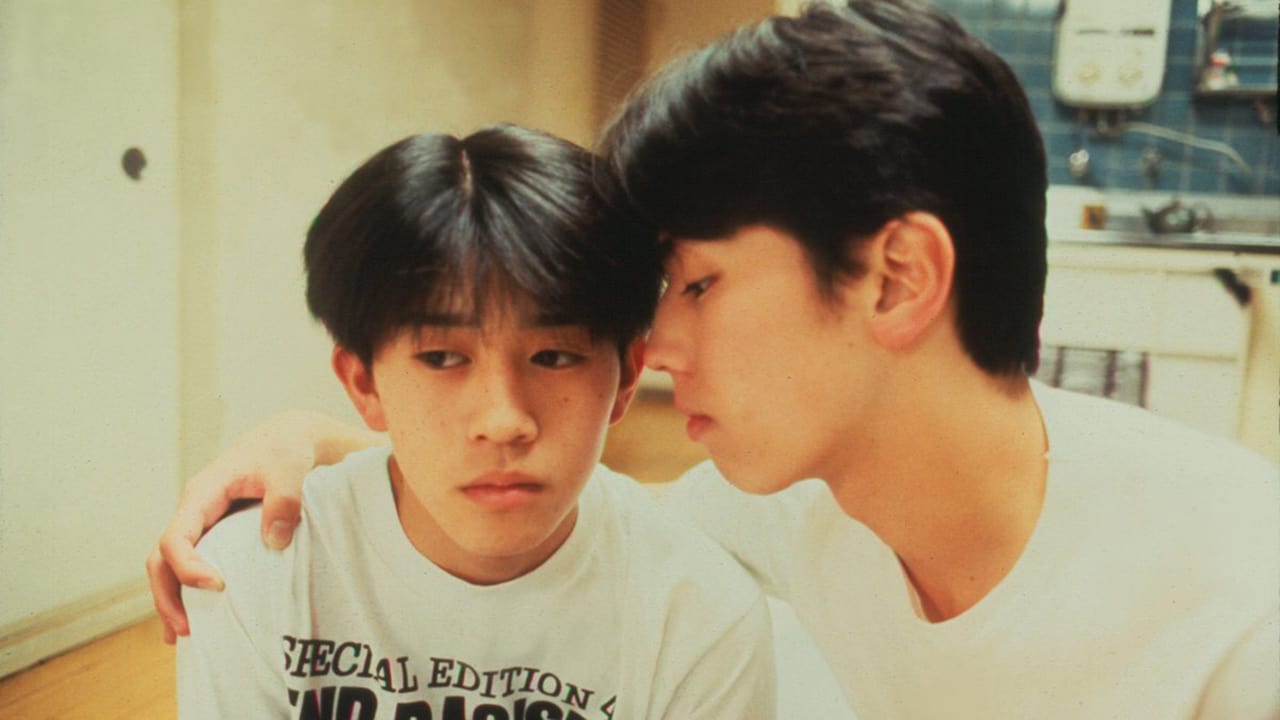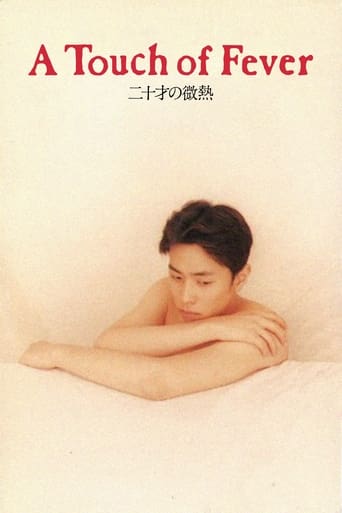



Wonderfully offbeat film!
Clever and entertaining enough to recommend even to members of the 1%
View MoreThe tone of this movie is interesting -- the stakes are both dramatic and high, but it's balanced with a lot of fun, tongue and cheek dialogue.
View MoreStrong acting helps the film overcome an uncertain premise and create characters that hold our attention absolutely.
View MoreThis film is the director's first feature. Homosexuality has always existed of course in all societies, Japan not being an exception, but I have read that this was one of the first films to deal with it in a matter of fact way. Granted a main protagonist who is in college but works as a rent boy every night is not you typical coming of age gay story. Nor does Hashiguchi beat about the bush. The very first scene sees the boy Tatsuro in a hotel room with middle-aged trick. Not does the boy act contrite or feel ashamed. As he says in the film when asked, the work does not disgust him. The actor who plays him- Yoshihiko Hakamada- is tall, with a aloof, steely demeanour. As the interviews make clear, he was cast after a lengthy audition, and many had commented then that both him, and the director Hashiguchi (then a very youthful 31) looked like brothers. He is superb. The film also details his relationship with a female classmate and a younger hustler to whom he unwittingly becomes a protector. (Masashi Endo who plays the latter looks like a non-professional actor, and his scenes are a bit awkward). Although Hashiguchi has dealt with homosexuality as central themes in later films, the subject matter is not so upfront and explicit as here. (HUSH his breakout film, has only one brief cuddle between the gay couple in the entire film). I guess as the mainstream beckons and the budgets get bigger, your films have to appeal to a wider audience to make some return.. Hashiguchi to his credit has found a middle way in later films without being a wash out (think of the misfires and Hollywood projects of Gus Van Sant as compared to the poetry of his first film Mala Noche for an example). However on the DVD I have (released by Water Bearer films) there is an interview with Hashiguchi who in fact says that on it's release the film (English translation- SLIGHT FEVER IN A 20-YR. OLD) did pretty well in revenues in Japan, especially among the younger audiences.
View MoreInitially I had concerned expectations, having read the synopsis of this story. I feared it could be sleazy, or all wrong, but since I liked a couple of the director's other films, I thought I'd try it.Thankfully, the main characters had more depth than I feared. We see the vulnerability and innocence of young males who've ended up in difficult and messy situations as a result of their potentially short-sighted choices, as they struggle with their genuine emotions.What I didn't like is the way the storyline didn't properly explore the love interest of the two young males - there was real potential for something more beautiful there, but instead all there was, was tense kissing between them in the hotel room in front of a middle aged man who had hired them, shortly before one of them breaks down into tears... So kind of worrying and disappointing overall. Like - it's a shame, how things turned out for them, so I couldn't really like the film because of this. On the flip side, there is at least a little bit of hope at the end, as they walk home together, hopefully for new beginnings.
View MoreIn this gay-themed Japanese film from the early Nineties, Tatsuru (Yoshihiko Hakamada), a college student, and Shin (Masashi Endô), who's in high school, work out of the same Tokyo bar called Pinocchio as gay rent boys. Yoriko (Reiko Kataoka) and Atsumi (Sumiyo Yamada) are their respective girl friends--but not girlfriends, though they'd both like to be. Tatsuru and Shin are teen dreamboats in their way: both have boyish, androgynous good looks and perfect hair they're always fussing with. At first the focus is on the tall Tatsuru, who's shown with a john in the opening sequence, which establishes that he is sexually ambivalent and emotionally shut down. He's good at sex supposedly, if you like making love with an alabaster robot. He's cut off from his family despite his father's attempts to maintain contact and lives in a tiny apartment by himself till Shin, who knows he's gay and comes out to his parents and is kicked out of the house, moves in with Tatsuru. This is only supposed to be temporary, but it brings things to a head because little Shin's in love with Tatsuru, as he's told Atsumi. She chides Shin later for chickening out of this opportunity to declare his love to Tatsuru. This is the old theme of the gay kid who falls in love with a straight guy, except the object of his affections isn't straight but just unwilling to admit he's gay, and to make things worse is a colleague in the skin trade..Ironically, Shin is a washout as a male prostitute. Or perhaps it makes sense that somebody who knows he's gay and is in love with someone he sees all the time will have trouble turning the sex on and off mechanically the way Tatsuru can.'Slight Fever' reeks of urban ennui, though cultural differences make it a little hard for a westerner to assess the mood of this elegantly understated film--which, nonetheless, is as Hashiguchi starts out a commentary by saying, "sensational," never more so than in the scene toward the end where he himself plays a client in a hotel room who winds up with both Tatsuru and Shin in his bed, a situation that goes very badly for all concerned. This is one of a series of tense surprises. In a previous one Tatsuru goes to Yoriko's house to help move a TV and is forced to stay to dinner only to discover Yoriko's father is one of his clients. Maybe this is meant to be funny, but both males appear to be imploding throughout a meal in which the two females chatter on and on. It seems like the only communicating in the film is with or between females, but it's mostly just empty chatter. The conversations that matter between or among the males never take place.The technically so-so DVD includes a bonus section made ten years after 'Slight Fever's' release where director Ryosuke Hashiguchi describes the experience of this, his first film, and two of the main actors who've had successful careers since tell how it was for them this first time. None of the four principals had had previous acting experience. The interview films also show stills taken on the set. Hashiguchi looked a lot younger, was boyishly handsome, much like Hakamada, who was fresh from the provinces and a fashion model whose cold, blank expression the director liked; and in fact as Hakamada reports, he and the director were confused with each other on the set more than once, though Hashiguchi never acknowledged the resemblance. Hashiguchi, with typical Japanese reserve, reveals little about himself other than that he is gay and that he labored over the script for 2 1/2 years because he wanted other people to "understand how it is." The gay life--did he live it in this way? Yes and no, probably. A gay man who had a sexually promiscuous youth can easily imagine what it is like to be a rent boy. Or maybe he was one. What is clear is that the contrasts between Tatsuro and Shin dramatize the difference between a boy who knows he's gay and one who's struggling with the fact.Hashiguchi reveals that the film was a surprise hit in Japan and young men and women are seen in stills lining up for blocks to see it, while provincial gay boys wrote the director to tell him his film saved them from suicide. Hashiguchi isn't wrong when he says the film is badly made. The project was underfunded and rushed and the technical package is unimpressive. It's shot in 16mm. Visuals are okay but not great, and as the director points out things fell apart style-wise when he chose to take on the role of the john in the hotel room at the end and they switched to a hand-held camera that gets way too jiggly at one point. But if this is the seminal gay coming of age film for a generation of gay Japanese boys, those faults don't matter. There are also signs that Hashiguchi has a flair for plot and editing, despite the extreme haste in which the latter had to be done, and his later efforts (which I haven't seen) are rumored to be successful. Judging from the lack of external reviews the film seems to have had zero theatrical life in the West, so despite its local success and a sort of interesting blend of shock and understatement and the fact that the performances do work, it seems like a minor film even from the gay point of view. Some scenes are fascinating; others with a slight shift in plot elements could just be moments from some conventional Japanese TV series. But if this was a ground-breaker and now could be a conventional TV series, that's not such a bad thing either.
View MoreThe word "Slight" in the title fits. Thin acting, an equally thin plot line, and a string of vacuously elongated scenes make up this film, which demonstrates what happens when a director in-over-his-head meets a half-finished script and no-experience talents."Fever" -- which is supposed to suggest "hot", not "tepid" -- wants to be a morality play about two young hustlers. Tatsaru is a college student working as a male prostitute. Shin works in the same establishment, a bar whose clients choose from a stable of boys.Aimed at a teen audience, apparently one motive of this movie is to distinguish for the audience the difference between sex for money and love. The film vaguely manages to approximate this, its only clear, idea ... then gives us two or three empty minutes to contemplate it.Both of the boys are sought after by girls their own age. The father of one girl is a client of Tatsaru in mid-film. When Tatsaru later goes to her parents' home for dinner, there is nothing but the embarrassed "tension" between the two men to keep us interested ... for at *least ten minutes.Another of the film's apparent motives: to establish that gay men are lonely, and that love between two men is hopeless. This sentiment -- uncontradicted by any of what passes for action in the film -- is spelled out verbatim by an drunken adult client toward the film's end in another of the stretched-beyond belief scenes. Many art films stretch action to good effect, but this film is just filling time.I hated "Twist" when I saw it, but it was at least competent as a film. "Sudden Fever" can't begin to aspire to that level.
View More